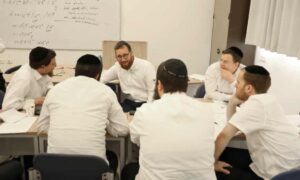
Entering Bnei Brak, an ultra-Orthodox neighbourhood just a few kilometres away from the gleaming towers that testify to Tel Aviv’s prowess as a global hi-tech hub, feels like stepping into a different world.
Despite the startups and advanced technology initiatives on their doorstep, much of Israel’s ultra-Orthodox, or Haredi, population still shuns modern inventions such as television and smartphones, which are viewed as a threat to their way of life.
And while the Haredim now make up 13% of the country, and one in four Israelis will be ultra-Orthodox by 2050, the divides between secular and religious Israelis are wide. Half of the ultra-Orthodox live in poverty and there have long been political clashes over the role of religion in public life and the fact that most Haredi men do not work or do military service, instead devoting their lives to Torah study.
But in a run-down office block on the outskirts of Tel Aviv’s diamond district, a small group of entrepreneurs have launched the Mego programme, a 14-month-long vocational training programme preparing ultra-Orthodox men with little knowledge of the modern world for careers in the lucrative hi-tech sector.
“People think we’re nuts to do this, but I believe that a spiritual way of life and economic success are not incompatible,” said Yitzik Crombie, Mego’s founder, an entrepreneur who also launched BizMax, a Haredi startup accelerator in Jerusalem, in 2017.
“There are about 300,000 people working in the hi-tech industry, but only 3% are Haredim. We are building programmes and tools to show the community what is possible.”
On a hot summer morning, about two dozen Haredi men, some in their 20s up to their 40s, were bent over books and laptops in one of Mego’s classrooms, asking a teacher questions. But rather than listening to a rabbi in the yeshiva, or Orthodox seminary, the students were learning about programming languages.
“I like to study, and I like the challenge, but it is difficult,” said 32-year-old Yoshua Rottenberg, a father of four. “Ultra-Orthodox schools do not teach Stem subjects at all. For a lot of the class it is a big shock.”
